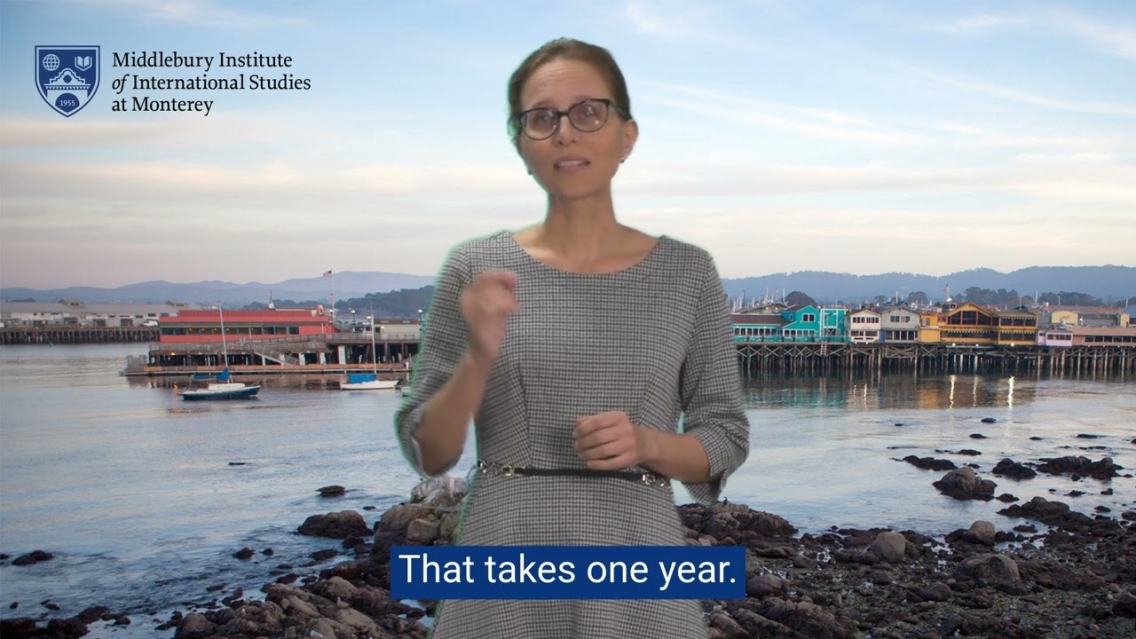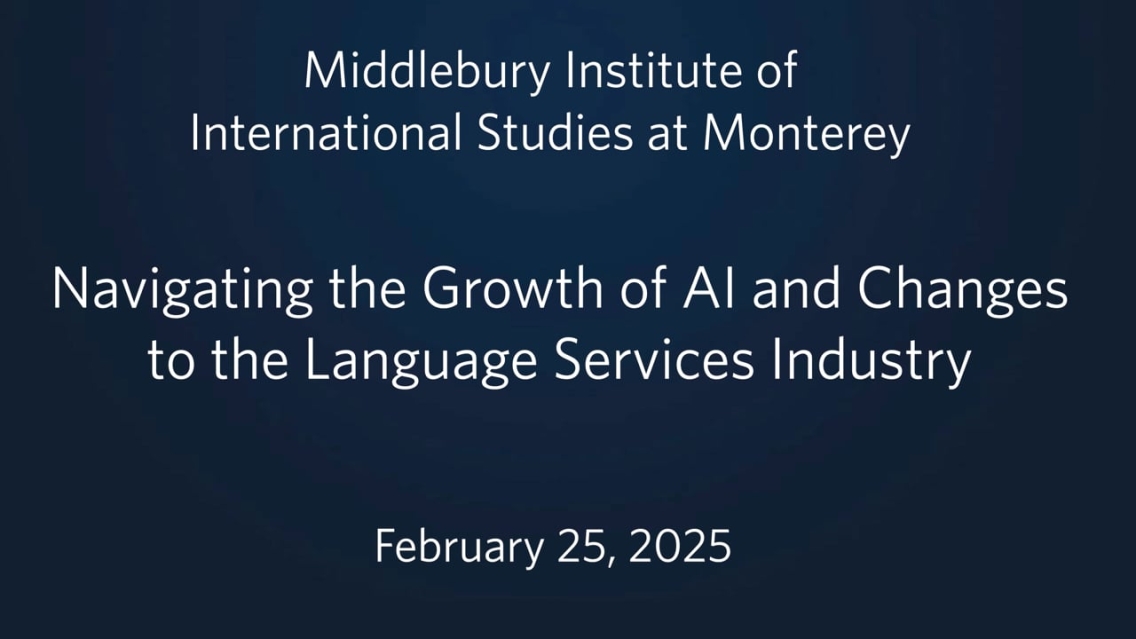Program Details: Translation and Localization Management
The Master of Arts in Translation and Localization Management is designed to focus on three key areas of training: translation, localization technology, and management.
Localization Program Comparison
| Semesters | Format | Professional Experience | Localization Coursework | Bootcamp | |
|---|---|---|---|---|---|
| Two-Year | 4 (fall start) | In Person | n/a | n/a | n/a |
| Accelerated Entry | 3 (spring start) | In Person | n/a | Required | Required |
| Advanced Entry | 2 (fall start) | In Person | Required | n/a | n/a |
| Localization Project Management | 20 months | Online | n/a | n/a | n/a |
Overview of Translation and Localization Management Programs
Program Chair Eva Klaudinyova walks through the range of programs offered both at our campus in Monterey and online, customized to a wide range of interests, needs, and experience.
Learning Goals
Students in the program learn the software applications that enable localization, gain the skills to manage complex projects with virtual teams, develop lifelong employability, and are exposed to the real-world experience of working in a translation agency for actual clients.
Visit the curriculum page to review the TLM learning goals.
STEM Designation
Our MA in Translation and Localization Management is designated as a STEM (Science, Technology, Engineering, and Mathematics) degree program. If you are an international student who graduates from this program, and you are eligible to apply for standard Optional Practical Training (OPT), you may also qualify to apply for a STEM 24-month extension of your work authorization. Our International Student and Scholar Services (ISSS) team can tell you more about these requirements.
U.S. citizens and permanent residents can take advantage of a number of scholarships for STEM-designated degrees.
Why the Institute: Connecting language to industry
My name’s Min Tan, I come from China. I’m studying translation and localization management at the Middlebury Institute. We think of translation as just translated from one language to another language. But localization is when you translate this text but it’s applied to the real-world industry, like you translate a website or translate a game into another language. This does not only include translation but also includes engineering work.
Right now I’m working for one of the world biggest localization and translation companies. They are located in the Silicon Valley. And my job is to assist the project managers and the enterprise program managers to ensure the on-time delivery of the localization projects.
I think my job right now is to connect everything I have learned here. We have learned how to be a good translator, how to be a good project manager, and how to use the tools in the industry right now. It has amazed me that the courses are so practical.
I can always learn a lot from my classmates, because they are very intelligent people and they have the same passions as I do. To study a Master Degree in the United States is a good opportunity for me to explore this country and explore this part of the world.
Monterey’s a very international city. Sometimes you will just run into people talking in two different languages. That’s why I choose to study at Middlebury Institute.
Language Requirement
During the application process, you will choose one of three tracks to fulfill the language requirement. All tracks include intercultural competence. The first two options require differing levels of fluency in a second language. The third track only requires fluency in English.
Translation Courses
If you want to become a translator or localization professional with translation or editing responsibilities, you should pursue translation courses to fulfill the language requirement.
- Take translation courses through our MA in Translation.
- Learn to provide high-quality translation and independently edit and revise pieces using the latest in translation technologies.
- Review the second language proficiency (including the Language and Skills Test) needed to take translation courses.
- Check out our available languages (all paired with English).
- Visit the curriculum page for details on your translation courses and credits.
Translation courses require native and near-native fluency in English and a second language. They are available through our translation and interpretation master’s degrees in the following languages, all paired with English:
If you are interested in German, Russian, or Korean, we strongly encourage you to apply by the preferred application deadline to ensure we have enough students to run those translation courses that year.
Language Studies Courses
If you want to be able to use a second language in professional settings, you should pursue language studies courses to fulfill the language requirement.
- Take content-focused courses in your target language.
- Develop specialized professional vocabulary and content knowledge in your target language, write business emails, participate in conference calls, and make presentations to clients.
- Review the second language proficiency needed to take language studies courses.
- Check out our available languages.
- Visit the curriculum page for details on your language studies courses and credits.
Language studies courses require 300-level or higher proficiency in the language. They are available in the following languages:
Intercultural Competence Courses
Many careers in the language services industry only require fluency in English, but you will be working with a diverse range of colleagues, vendors, and clients.
- Take intercultural competence courses.
- Learn to effectively listen to, communicate with, and take action in communities with a range of linguistic and cultural backgrounds.
- Launch a career as a project coordinator, project manager, program manager, localization engineer, and in most technical or management roles.
Specializations
Pursue an optional, career-oriented specialization to deepen your expertise in a particular area:
Creative Media Localization
Focus on localizing news and entertainment, including video games, movies, and multimedia content for companies like Netflix, Sony, Nintendo, and Blizzard Entertainment.
Alumni examples:
Localization Program Management
Manage teams, develop strategy, align with business objectives, and execute operations at the program level, not just individual projects. Coordinate with internal stakeholders and external vendors to deliver consistent global content.
Alumni examples:
Language Services Management
Oversee large-scale, multilingual projects across regions or product lines, ensuring timelines, budgets, and quality standards are met. Manage the sourcing, quality control, and workflows of translation and linguistic services, and work closely with translators, editors, and reviewers to maintain linguistic accuracy and cultural relevance across markets.
Accelerated Entry
If you meet our accelerated entry requirements, you may complete your master’s in 45 credits. This full-time master’s allows you to graduate in three semesters. Spring 2026 is the final intake in this program. Learn more.
Advanced Entry
If you meet our advanced entry requirements, you may complete your master’s in just 32 credits. Note that advanced entry students also have greater flexibility on the language requirement. This full-time master’s allows you to graduate in just two semesters. Learn more.
Joint Translation and Interpretation/Translation and Localization Management degrees
Fall 2025 was the last intake of this joint degree, which allowed students to launch a flexible career in the language services industry with advanced language and technical skills. Earn two master’s degrees in three years by combining TLM with an MA in Translation, an MA in Translation and Interpretation, or an MA in Conference Interpretation.
Learn more about the joint master’s degrees.
Online MA in Localization Project Management
If you are new to the localization industry, you can launch a career in localization project management through our online, asynchronous, 30-credit program. You can continue working while you study but you will not have as many immediate career options as the in-person two-year program provides. Learn more.




